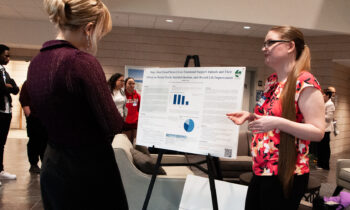
800-NEXT STEP will provide help to those in need at any time of the day, night
Residents of Harford County now have access to a 24/7 behavioral health, mental health and addiction services crisis hotline. 800-NEXT-STEP (800-639-8783) is the centralized telephone number for people in crisis to call, operated by behavioral health professionals who can help navigate the often complex system of care.
The hotline is made available through a public-private partnership led by University of Maryland Upper Chesapeake Health along with Harford County Government, Healthy Harford/Healthy Cecil, Harford County Health Department and Office on Mental Health/Core Service Agency of Harford County, Inc.
“Many of us in the health care community in Harford County have been discussing the need for a 24-hour hotline to help those in crisis,” said Lyle E. Sheldon, FACHE, president and CEO of University of Maryland Upper Chesapeake Health. “The hotline is a way for individuals to find help in one convenient location. Many people with behavioral health issues come to the emergency room because they don’t know where else to go to seek help. The new hotline will provide the information they need in a timely manner.”
Harford County Executive Barry Glassman said, “When Harford County citizens or families are in crisis, we want them to know they are not alone and help is available. The depths of addiction, depression or thoughts of suicide can strike at any time, night or day. That is also a window of opportunity when access to a caring professional and connections to the right resources will save lives.”
When someone in crisis calls the new hotline, he/she will reach a behavioral health expert who has rapid access to the Mobile Crisis Team in addition to the most up-to-date information about behavioral health and addiction services providers across the region. Peer specialists who are in recovery themselves will also be available to callers. Follow-up with callers will be coordinated by care navigators.
The 24/7 hotline provides numerous benefits. With several behavioral health service providers in the region, a single source hotline takes the guesswork away from the caller. Prior to the hotline, there was misunderstanding or no understanding of who provides what service. The hotline takes away the guesswork and provides one number to call to learn about the broad array of community services available based on the caller’s needs.
“The opening of the 24/7 crisis hotline and mobile teams is monumental in Harford County,” said Sharon Lipford, executive director of Healthy Harford/Healthy Cecil. “This will positively change how people in crisis can receive help for mental health and addiction. It’s the first step in creating a truly comprehensive crisis system in the county.”
The hotline and Mobile Crisis Team are coordinated by the Office on Mental Health/Core Service Agency of Harford County, Inc.
“800-NEXT STEP helps us increase behavioral health awareness and break down the stigma associated with mental health and addiction,” said Jessica Kraus, executive director of the Office on Mental Health/Core Service Agency of Harford County, Inc. “Our partnership and collaboration with other agencies is a role model for Maryland and helps all of us address pressing needs facing the Harford County community.”
The previous crisis call line was available for a limited number of hours each day. 800-NEXT-STEP is available 24 hours a day. An additional local phone number, 410-874-0711, connects callers to the crisis center when calling from outside the state of Maryland.
The hotline is located at the Harford Crisis Center in Bel Air. The building, which will house several services to help those in crisis, will open to the public in 2019. More information about the crisis center will be available in late October.
In addition, organizers are working to link the hotline to 2-1-1 Maryland, a 24/7 statewide health and human service referral provider, in order to share resources and provide a seamless, regional approach to people in crisis.
Behavioral health encompasses common issues such as anxiety and depression, alcohol and substance-related disorders as well as the lesser occurring issues such as schizophrenia and other psychotic disorders.
About University of Maryland Upper Chesapeake Health
In December 2013 Upper Chesapeake Health became University of Maryland Upper Chesapeake Health. It consists of the University of Maryland Upper Chesapeake Medical Center and the Patricia D. and M. Scot Kaufman Cancer Center in Bel Air, the Senator Bob Hooper House in Forest Hill and the University of Maryland Harford Memorial Hospital in Havre de Grace. The leading health care system and largest private employer in Harford County, UM Upper Chesapeake Health offers a broad range of health care services, technology and facilities to the residents of northeastern Maryland. Visit www.umuch.org for more information.



